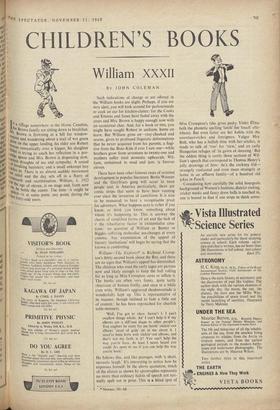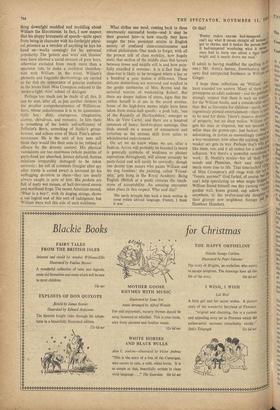CHILDREN'S BOOKS
William XXXII
By JOHN COLEMAN
11'1a village somewhere in the Home Counties, ntile Brown family are sitting down to breakfast. ail is frowning at a bill for window- s and wondering about a trail of wet green pain. 0100;1,0n the upper landing, his elder son Robert Ethel 3 romantically over a kipper, his daughter is trying to catch her reflection in a por- rkige sPoon and Mrs. Brown is dispensing slow, sedate draughts of tea and sympathy. A sound (If breaking banisters; and a small unkempt boy in. There is an almost audible movement cf relief and the day sets off in a flurry of ,rer)r°ach and recrimination. William, b. 1922 .4 the age of eleven, is on stage and, from now
""' he holds the centre. The time—it might be added
I —is at some point, any point, during the '4si forty-odd years.
Such indications of change as are offered in the William books are slight. Perhaps, if you are very alert, you will look around for parlourmaids or cock an ear for kitchen-clatter; for the Cooks and Emmas and Janes have faded away with the years and Mrs. Brown is happy enough now with an occasional char. And, for a book or two, you might have caught Robert in uniform, home on leave. But William grins on—rosy-cheeked and serene, given to profound linguistic deformations that he never acquired from his parents, a fugi- tive from the Bisto Kids if ever I saw one—while brothers grow from seventeen to twenty-one and mothers suffer total domestic upheavals. Wil- liam, embalmed in mud and jam, is forever eleven.
There have been other famous cases of arrested development in popular literature. Bertie Wooster and the Greyfriars gang will occur to most people and; in America particularly, there are comic strips that seem to have been running ever since the invention of cuneiform. It is nice to be reassured, to have a recognisable pivot for adventure. What happens next is richer if you know, or think you know, something about whom it's happening to. This is anyway the charm of simplified forms of art and the lack of the rebarbative factor in existentialist crea- tions: no question of William or Bunter or Biggles suffering molecular sea-changes at every comma. Any examination of the appeal of literary 'institutions' will begin by saying that the known is comforting.
William—The Explorer* is Richmal Cromp- ton's thirty-second book about the Boy, and there are no signs that William's appeal has diminished. The children who read the early sagas are parents now and likely enough to keep the ball rolling for as long as Miss Crompton cares to inflate it. The books are often very funny, quite tartly observant of human frailty, and once in a while even witty. William's aggrieved rhodomontade is wonderfully kept up. This is representative of its manner, though inclined to fade a little out of context: he has been reproached for churlish table-manners.
'Well, I've got to chew, haven't I, 1 can't swallow things whole. An' 1 can't help it if my elbows are a diff'rent shape to other people's. You oughter he sorry for me havin' stickin'-out elbows 'stead of goin' on at me about it. I must've been born with stickin'-out elbows, and that's not my fault, is it? You can't help the way you're horn. At least I never heard you could. It's news to me if you can help the way you're born.
He follows this, and like paisages, with 'a short, sarcastic laugh.' It's interesting to notice how he expresses himself. In the above quotation, much of the elision as shown by apostrophes represents no more than ordinary habits of speech not nor- mally spelt out in print. This is a blind spot of
• Newnes, 10s. 6d, Miss Crompton's (she gives pesky Violet Eliza- beth the phonetic spelling 'notch' for 'touch'
where). But even lazier are her habits with the nouveaux-riches and foreigners. Vulgar Mrs. Bott, who has a hellish time with her aitchcs, is made to talk of 'voo' for 'view,' and an early Hungarian refugee of `ze gown of dressing.' But the oddest thing is surely those sections of Wil- liam's speech that correspond to Thomas Henry's jolly drawings of him: he's the cockney kid— strangely rusticated and even more strangely at home in an affluent family—of a hundred old jokes in Punch.
Considering how carefully the solid bourgeois background of Women's Institute, district visiting, cricket weeks and fancy dress balls is touched in, one is bound to find if one stops to think some- thing downright muddled and muddling about William the Elocutionist. In fact, I now suspect that his sloppy brusquerie of speech—quite apart from being in character with his forthright physi- cal presence as a wrecker of anything he lays his hand on—works cunningly for his universal popularity. The `potters' and 'wots' and 'dunnos' may have allowed a social stratum of poor boys, otherwise excluded from much more than a spectator role, to make a confident identifica- tion with William. In the event, William's phonetic and linguistic shortcomings are carried so far that the appearance of genuine cockneys in the books finds Miss Crompton reduced to the 'strike-a-light, mite' school of dialogue.
Perhaps too much can be made of all this. It can be seen, after all, as just another element in the peculiar comprehensiveness of William-as- hero, whose seductiveness it is to be quintessen- tially boy: dirty, courageous, imaginative, clumsy, chivalrous, and romantic. In him there is something of the lonely self-sufficiency of Jefferies's Bevis, something of Stalky's group- honour, and echoes even of Huck Finn's adven- turousness. He is the sort of boy men still think they would like their sons to be, robbed of offence by the dreamy context. His physical vandalisms are too enormous (whole pantries of party-food are absorbed, houses defaced, human relations irreparably damaged) to be taken seriously: his toll of criminals (burglar after spy after tramp is carted away) is leavened by his unflagging devotion to them—they are nearly always caught in spite of him. His pockets are full of nasty wet messes, of half-devoured sweets and moribund frogs. The recent American record, 'What is a boy?', with its singing strings, shows a sad logical end of this sort of indulgence; but William stays well this side of such sickliness.
What strikes one most, coming back to these enormously successful books—and it may be their greatest lure—is how exactly they have caught the twin persistent strains in English society of confused class-consciousness and robust philistinism. One tends to forget, with all the present talk of class mobility, how hugely static that section of the middle class that hovers between lower and middle still is and how pain- fully stratified it remains: it is a fact that the class-war is likely to be strongest where a hat or a hundred a year makes a difference. These delicate distinctions are mirrored and mocked in the gentle snobberies of Mrs. Brown and the sartorial worries of weekending Robert. But there are deeper indices of stress, signs that the author herself is at sea in the social niceties. Some of the high-born names might have been taken from music-hall spoofs: a posh lady, 'one of the Randalls of Hertfordshire,' emerges as Mrs. de Vere Carter, and there are a hundred instances of fancy, hard-to-place namings. One finds oneself on a seesaw of amusement and irritation as the stresses shift from satire to wholehearted endorsement.
On art we do know whore we are, after a fashion. Artists will probably be bearded (a beard is generally symbolic of weakness or phoney aspirations throughout), will almost certainly be pasty-faced and will surely be cowardly; though one decent type occurs who paints William and his dog Jumbles: the painting, called 'Friend- ship,' gets hung in the Royal Academy. Being English (British at a push) remains the touch- stone of acceptability. An amusing encounter takes place in this respect. Who said this?
'His uncle brought him back a book written in some rotten abroad language. French, t think it was. ,
Or this?
'Poetry makes anyone bad-tempered. can't say what it means straight off because, got to rhyme, and it makes the person rein( it bad-tempered wondering what it meaDS:,,j1 once had to learn one about a tiger burl bright and it nearly drove me mad.'
(I admit to having modified the spelling ra t„bi!1 one.) Mr. Amis's heroes, freewheelirg agar d find unexpected forebears in William a° Ginger.
I hope these reflections on 'William'
have sounded too austere. Many of them rat'; I presuppose an adult audience—and the published strongly suspect that there is such an audier/st• for the William books, and a considerable 0°,4, that. But as literature for children—quick, ware ingeniously plotted entertainment—there is rii.,0 to be said for them. There's massive destruet'en of property, but no deep malice. William nil,. gets his man or sixpence, but not because hjs wilier than the grown-ups: just luckier. And 0 astonishing, in stories so resoundingly centred!, a boy-musketeer, how often the cajoling, bullYI.L;(3 weaker sex gets its way. Perhaps that's whY g1. like them, too, and it all makes for a tenderls0;( influence. Yet there's a powerful remotencssor work: E. Nesbit's stories—for all their P530 meads and Phoenixes, their easy magic-7T,e much more true to life. That time-locked vi113`,,f of Miss Crompton's still rings with the cll., 'Tennis, anyone?' God forbid, of course, but 'if can't help speculating on what might haPPefitto William found himself one day yarning over I; garden wall, knees grazed, cap askew, 070f anywhere, to the twelve-year-old daughtermr, their grumpy new neighbour, foreign old .h Humbert Humbert.















































 Previous page
Previous page